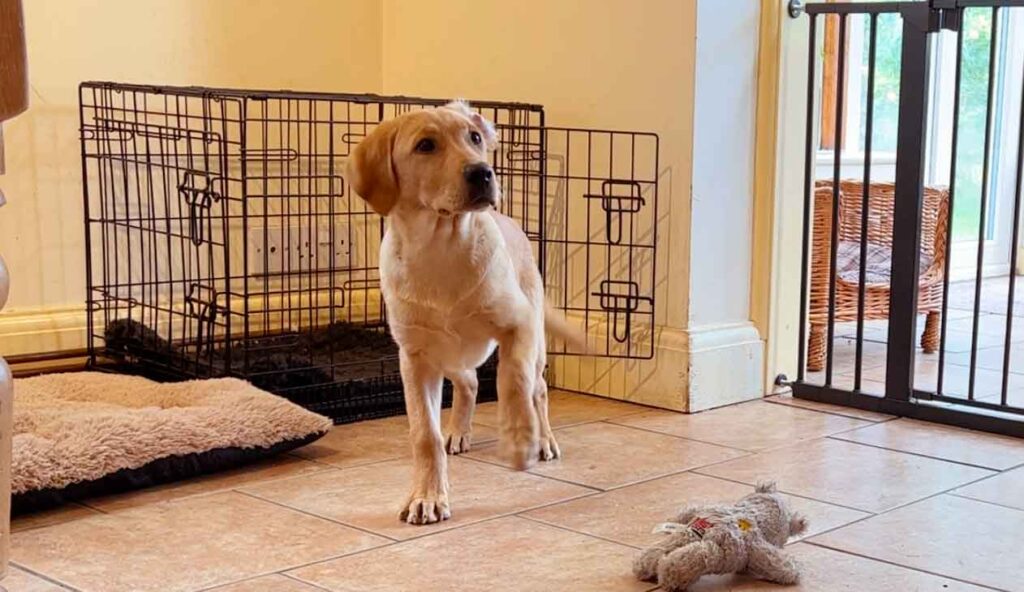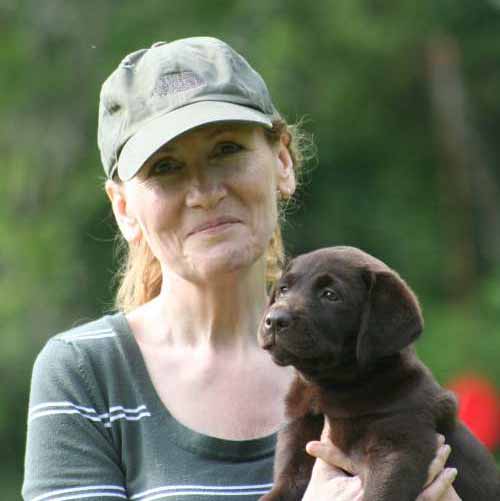We all want our puppies to be normal. At least within reason. And while we are happy if our puppy is abnormally clever, or skilled, some other kinds of abnormal are a big worry for puppy parents.
Perhaps the biggest worry of all, is knowing what is normal and what is definitely not.

And the main purpose of the information below is to reassure you. Because many of the behaviors that you might be worrying about in your puppy are likely to be within the realms of normal.
When puppies do start to show signs of abnormal behavior, early intervention can make a big difference. So I also think it’s important to touch on some of the ways in which puppy development can occasionally go wrong.
That way, you’ll know if, and when, to get help.
Some problems with puppy development have more far reaching consequences than others. Potentially ending in a puppy being relinquished to a shelter or even abandoned.
The kinds of problem that are most likely to endanger a puppy’s future are those affecting behavior, especially where noise, or fear or aggression are involved.
So let’s start by looking at how a puppy might be expected to react in the presence of new and potentially scary experiences, such as meeting new people, or a first encounter with a noisy vehicle.
Fearful behavior
Healthy puppies under 12 weeks old are curious and willing to explore and interact. That doesn’t mean they are never afraid.
Novel experiences may make a young puppy hesitate, and even look a bit worried initially. But a normal puppy recovers rapidly when introductions to new sounds and sights are made gradually.
If a puppy regularly cowers or freezes frequently in response to new experiences, this is definitely not normal. Nor is attempting to hide or escape.
Nor is it normal for a puppy to regularly scream out in fear when something new happens. Or to bark furiously, with their hackles up.
If any of these things are happening with your puppy, they are serious warning signs. And it’s important that you get some professional help.
Make an appointment with your veterinarian. Sooner rather than later, and explain to them what is happening. If necessary they will refer you to a behaviorist who specializes in helping reactive and fearful dogs.
Disordered eating
Puppies need to eat well in order to grow and thrive. And they are not always the best judge of what’s good for them, so you will have to make those decisions.
Like babies, puppies also explore their world with their mouths, and sometimes swallow things that they shouldn’t. Including bits of bedding and broken toys.
This is normal and is another reason why setting up a puppy zone is a good idea.
Unfortunately it is not uncommon for puppies to get into the habit of repeatedly swallowing dangerous objects such as small stones, that can gather in their stomach. Resulting ultimately, in a medical emergency.
This is not normal. And may sometimes be associated with a wider problem such as canine compulsive disorder, and possibly with resource guarding. Dogs don’t have pockets, so swallowing things is after all, their best way of making sure no-one else can have them!
Stone eating can also be a habit that was triggered in some way. Possibly because stones have been repeatedly snatched from the puppy when they are playing with them. Swapping is always a better approach when trying to remove unsafe items from your puppy.
It’s also a good idea to make sure that small puppies don’t have access to areas of gravel or pea shingle in your yard if at all possible. This may help to reduce the risk of playing with stones turning into a stone eating habit.
Having your puppy wear a houseline will also help as this allows you to restrain the puppy without panicking them into swallowing their prize, and give you a chance to grab some tasty treats to offer them as a swap.
If your puppy does start repeatedly swallowing non food items, whether it’s stones, paper, or other items, do make an appointment to talk to your veterinarian without delay.
Forceful biting
All puppies will mouth and chew on fingers placed near their face. By the time your puppy joins your family at eight weeks old, they should have learned some bite inhibition.
That simply means when they mouth and chew on your hand, the puppy doesn’t actually break the flesh and draw blood. Even though they are perfectly capable of doing so. Raw fed puppies this age are able to crush bones and tear meat with their teeth.
But a normal puppy understands that using their mouth in play means exercising a degree of self control.
This does not mean that your puppy’s teeth don’t hurt. Those tiny teeth are needle sharp, and your puppy is still learning that human skin is not as tough as the fur covered skin of their siblings.
It is within the realm of normal for puppies to occasionally leave a tooth mark, or even draw blood if they get very excited during play. There is information on managing the bitey phase in this article: When Puppy Biting Gets Too Much
But sometimes a puppy will repeatedly bite in a way that is not normal. And you may need extra help with resolving this.
While some degree of playbiting is normal, it is not normal for a puppy to bite defensively in order to prevent you handling them or picking them up.
Nor is it normal for a young puppy to bite to protect toys, or to defend their bed or crate.
If your puppy is regularly drawing blood and giving painful bites, this needs investigating.
A dog with poor bite inhibition is not a safe dog to be around, especially for children or other vulnerable people. This kind of behavior will only get worse, and this is a problem that needs addressing now.
Not listening
If a puppy with good hearing doesn’t listen to anything you say, I can reassure you that this is normal. While some puppies are more distractible than others, not listening is the normal, default state for every puppy.
It’s nothing to worry about and it’s easily fixed with training games that encourage focus and attention.
Hearing loss does occasionally occur in dogs, more commonly in dogs with white patches over their heads and ears. If you suspect that your puppy cannot hear you, a trip to your veterinarian is in order. They will be able to carry out a hearing test and confirm your suspicions, or put your mind at rest that your puppy’s hearing is ok.
You will still be able to train your puppy, even if they cannot hear. You’ll need to use signals rather than commands, and your veterinarian will be able to advise you on this.
Soiling indoors
Some sources give a rather false impression of how long it takes to potty train a puppy. In fact, occasional accidents are common right up to around six months of age. And they often happen because we get sloppy and forget this is just a young dog that still needs regular opportunities and reminders to toilet outside.
It is also normal for potty training to regress at about three months old as we start to loosen our concentration on where the puppy is and how long it is since they were last taken out.
It’s normal again for a puppy to wet its bed if left in a crate too long, often because we are longing for a bit of a lie in, or stayed a bit too long at the shops!
It is not normal for a puppy over four months old to start repeatedly messing and wetting their bed overnight. Or to be still pooping indoors several times a week. Occasionally, especially with a female puppy, this can be caused by a bladder infection. But it is usually a sign that the puppy has been pushed beyond the limits of their immature bladder and bowels.
All puppies are born with a natural instinct to keep their nest or bed clean. And if the puppy is forced to empty themselves in their bed on several occasions this can cause a serious breakdown in this instinct.
If you have gotten to this point you may need help from a behaviorist, but in the first instance, follow this link to get yourself back on a good potty training schedule as if you had a new puppy. This can often resolve the problem quite quickly.
Things you can do
- Socialize your puppy thoroughly
- Train your puppy using positive reinforcement and games
- Get help promptly
It’s time to get help if your puppy shows red flag behaviors such as biting when handled or restrained, disordered eating, or some of the extreme fear reactions discussed above instead of normal puppy curiosity.
Your veterinarian is the first port of call, and they will if necessary be able to refer you to a qualified behaviorist. You’ll also find further resources in the links above
Is it my fault?
With some of the most serious issues above, such as reactivity or fearful behavior, it is unlikely to be your fault that your young puppy is behaving this way.
It’s possible that you could have triggered the reactivity by letting your puppy be exposed to an overwhelmingly scary experience, but the chances are that your puppy has inherited a genetic tendency to fearfulness, and would have been a challenge in the most expert of hands.
Some of the issues that can arise while raising a puppy, are caused by inappropriate management. But you need to go easy on yourself here. Because we can only do what we know. And puppy raising is a steep learning curve.
If you have made mistakes, whether its crating your puppy for too long, or using ineffective training methods, all you can do is learn from those mistakes. Do your best going forwards, and if you are able to pass better information to the next generation of puppy parents you will be helping more dogs that way.
And if you are currently struggling with any of the issues above, do join our Facebook support group for more information and advice.

Free Training Tips
Get Pippa's free dog training tips delivered to your inbox

 Calming Techniques For Over Excited Puppies
Calming Techniques For Over Excited Puppies